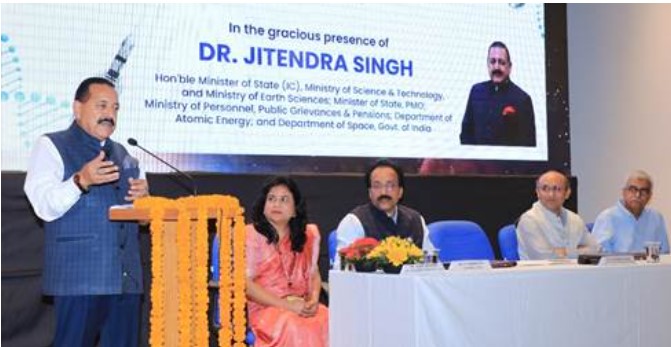
(Photo : https://pib.gov.in)
- India plans to launch its own space station, the "Bharatiya Antriksh Station", by 2035.
- The project was announced during the signing of an MoU between ISRO and the Department of Biotechnology (DBT).
- The collaboration will focus on integrating biotechnology with space technology, marking a new era of scientific innovation.
- The government and private sector's support for this project reflects India's commitment to advancing its space and biotechnology sectors.
India is on the brink of a significant leap in space exploration with the announcement of its own space station, the Bharatiya Antriksh Station, expected to be operational by 2035. This ambitious project was announced by Union Minister of State (Independent Charge) for Science and Technology, Dr Jitendra Singh. The announcement was made during the signing of a landmark Memorandum of Understanding (MoU) between the Indian Space Research Organisation (ISRO) and the Department of Biotechnology (DBT).
The MoU aims to integrate biotechnology with space technology, marking a new era of scientific innovation in the country. The collaboration will focus on areas such as microgravity research, space biotechnology, space biomanufacturing, bioastronautics, and space biology. The MoU also outlines several key initiatives, including the establishment of the Bharatiya Antriksh Station and the unveiling of the 'BioE3' policy, which stands for biotechnology for economy, environment, and employment.
Dr Singh praised ISRO Chairman S. Somnath and Secretary, Department of Biotechnology, Dr Rajesh Gokhale, for their efforts in making this collaboration possible. He also highlighted the significant role of public-private participation in the rapid growth of India' s space sector. The number of space startups has grown significantly, with nearly 300 startups now contributing to the space economy.
ISRO-DBT Partnership and Future Plans
The partnership between ISRO and DBT is expected to benefit the national human space programme and spur innovations in human health research, novel pharmaceuticals, regenerative medicine, and bio-based technologies for efficient waste management and recycling. The Department of Biotechnology's role in developing the first-ever DNA vaccine, which brought global recognition to India's scientific capabilities, was also acknowledged by Dr Singh.
In September, the Union Cabinet approved the fourth mission to the Moon and also gave a green signal for the building of the first unit of the Bharatiya Antriksh Station (BAS) by 2028. The government had envisaged an Indian Space Station by 2035 and an Indian to land on the lunar surface by 2040. Towards this goal, the Cabinet approved the development of the first module of BAS-1.
The ISRO chairman, S. Somanath, mentioned that some of the test flights prior to the main Gaganyaan mission might include some of these experiments. The primary plan, however, is for the BAS. The Union Cabinet also approved the development of the Venus Orbiter Mission (VOM) that will explore the Earth's sister planet. The cabinet also cleared the development of a reusable next-generation launch vehicle (NGLV) 'Soorya rocket' that will have three times the present payload lifting capability.
Biotechnology Sector in India
The biotechnology sector in India has been making significant strides. Biotechnological companies are playing an essential role in the development of agricultural technologies to help increase yields and reduce costs for farmers. They are also exploring ways to use renewable energy sources for generating electricity and providing clean drinking water for people. The government has set up a Biotechnology Industry Research Assistance Council (BIRAC), which provides financial and technical assistance to biotechnology startups and SMEs in India.
The federal government, principally through the National Institutes of Health (NIH), funds scientific research related to biology and human health that sets the stage for applied research and development (R&D) activity by industry, ultimately leading to the commercialization of new medicines and treatments. New drugs not only improve the quality and length of lives but reduce the costs to society from illness.
* This is a contributed article and this content does not necessarily represent the views of btin.co.in









